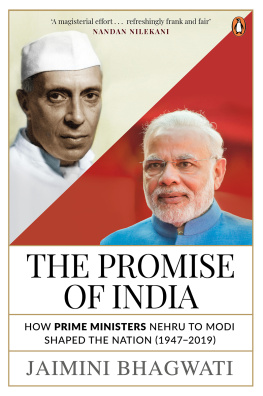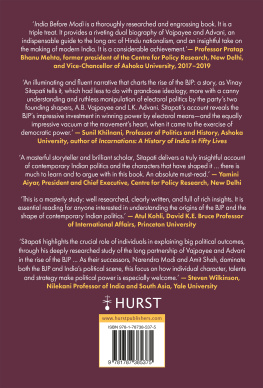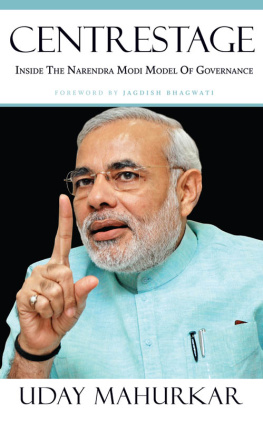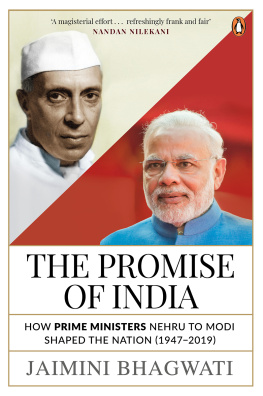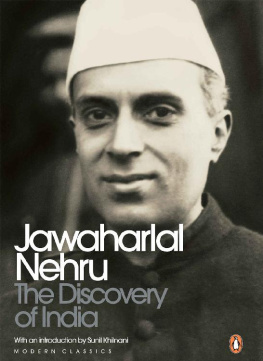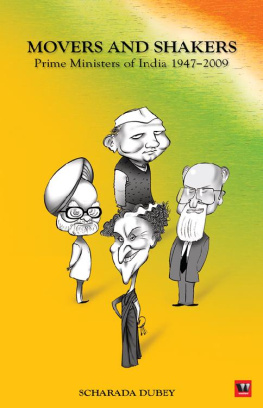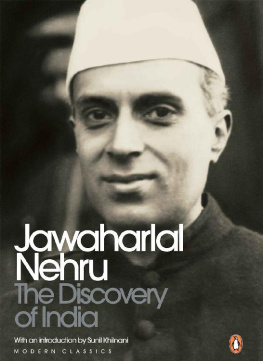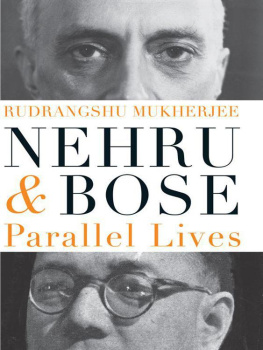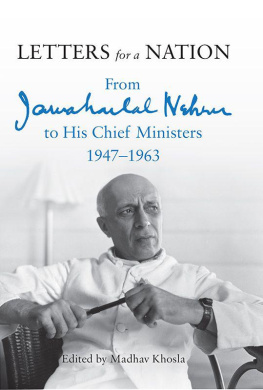Advance Praise for the Book
Bhagwatis book is refreshingly frank and fair. It is a magisterial effort, informed by his unique roles in Indias government. It dissects Indias governance issues both past and for the future with exceptional clarity. It is a must-read for the young and seasoned alikeNandan Nilekani, chairman and co-founder of Infosys and founding chairman of UIDAI (Aadhaar)
A thoughtful and nuanced consideration of Indias economic and foreign policies since Independence by a highly respected economist and diplomat with practical experience at the highest levels of government. By using the prism of leaders, namely, Indian prime ministers, this book makes great and significant issues accessible not only to the specialist and scholar but also to the general readerShivshankar Menon, former foreign secretary and national security adviser
With his versatile background, Bhagwati provides a bridge between news headlines and the reality of behind-the-scenes public policymaking under each of the prime ministers since Independence. This timely book is a fascinating insiders account of the interplay of politics, economics, diplomacy, administration and financial markets.
The Promise of India is unique in its sweep, providing insights not just on the past and present, but also on future possibilities. It is a must-read for leaders and laypersons, scholars and students of the social sciencesDr Y.V. Reddy, former governor, Reserve Bank of India, and chairman, Fourteenth Finance Commission
An extraordinarily extensive birds-eye survey of our post-Independence evolution. The number of facts cited bears witness to Bhagwatis range of knowledge, as his literary quotations do to his range of interests, all brought in with an admirable sense of values and lightness of touch. He must write several more books to help us digest the full feast for which this is a most enjoyable appetizerK.S. Bajpai, former ambassador
A fascinating history of post-Independence India told with originality through studies of each prime minister individually by someone who has had an unusually wide experience of working for the Government of IndiaMark Tully, senior journalist and author of No Full-Stops in India
A unique compendium of political and economic history, insightfully captured through the lens of one of Indias finest diplomats. To truly understand Indias progress over the years, Bhagwatis book is a must-readDeepak Parekh, chairman, HDFC Limited
Prologue
The Promise of India Endures
In the last few years, I have thought every now and then about writing on why I love India and yet why I am infuriated by it. I have been fortunate to have worked on both sides of Rajpath in New Delhiin the Ministry of External Affairs to the south of Rajpath and the Ministry of Finance to the north. I decided that perhaps I do have something of interest to say about the background to and consequences of the path taken by India at the crucial crossroads since Independence.
The geographical region called India has endured through the ages but was raided repeatedly, plundered, splintered, colonized, and eventually brought together as one nation. Independent India has progressed impressively on several fronts. The ironies of the countrys successes and many abject failures have been delightfully satirized through the decades in the facial expressions and dilemmas of the average man and his wife in R.K. Laxmans cartoons. It is the common people who have brought post-Independence India back on track time and time again by participating enthusiastically in large numbers in the elections.
After Independence, India started on the task of building a new country out of the depths of its colonial past. From then on, there have been periods of promise, and there have been several setbacks. With rising awareness, the masses among the electorate are likely to seek greater accountability from Indias political elites. This should help the country in its continuing quest to achieve a fuller expression of its soul. Such an indefinable goal may be too ambitious, yet it tugs at the heartstrings of Indians as they yearn for a future which is consistent with the teachings of Indias ancient past.
After 1947, India has been shaped to a significant extent by decisions taken by its prime ministers (PMs), and they have been responsible for uplifting and even soaring successes as well as depressing failures. I use the words soaring and depressing because those are precisely the emotions I feel when I reminisce about crucial Indian decisions. The focus of this book, then, is primarily on the role played by Indias PMs, and to some extent, by cabinet ministers, senior officials and the judiciary. At a birthday celebration for Dr Shankar Acharya at the India International Centre in Delhi, Mark Tully, the former bureau chief of the BBC in India, challenged me to condense the central contents of this book into one sentence. I gulped for a moment, collected my thoughts and said that the book tracks the extent to which Indias political leadership at the apex level had raised optimism or cynicism among Indians. To place this assessment in perspective, the India that each PM inherited and subsequently bequeathed to the successor is outlined at the beginning and end of each chapter.
The book covers over seventy-one years of Indias foreign and economic policies and practices. Each chapter, focusing on one or a couple of the short-lived PMs, includes factual narratives to provide the context for observations and conclusions. India, as a federation of states, The Central governments annual budgets have to be approved by the PM and by the Lower House of Parliamentthe Lok Sabha.
Deriving its powers from the Indian Constitution, the Central government headed by the PM, even compared to the combined weight of all state governments, continues to have a predominant say in running the country. Shivshankar Menon is of the view that there is a determinant role of the Prime Minister in India. Menon is referring to foreign policy decisions but this is equally true about Indias economic policies.
The prime minister, as primus inter pares in the Central government, is the key decision maker in all important appointments. The PM, as the head of government and the chairman of the Appointments Committee of the Cabinet (ACC), is the final arbiter in the selection of the chief election commissioner (CEC), comptroller and auditor general (CAG), all Indian ambassadors and high commissioners around the world, and all secretary-level officers of the Central government including the chairman of the Atomic Energy Commission, the heads of the Indian Space Research Organisation (ISRO) and Defence Research Development Organisation (DRDO). The heads of the three wings of the armed forces are also selected by the ACC, as are the heads of financial-sector regulatory agencies such as the Reserve Bank of India (RBI), the Securities and Exchange Board of India (SEBI), and the deputy chairman of the erstwhile Planning Commission.

